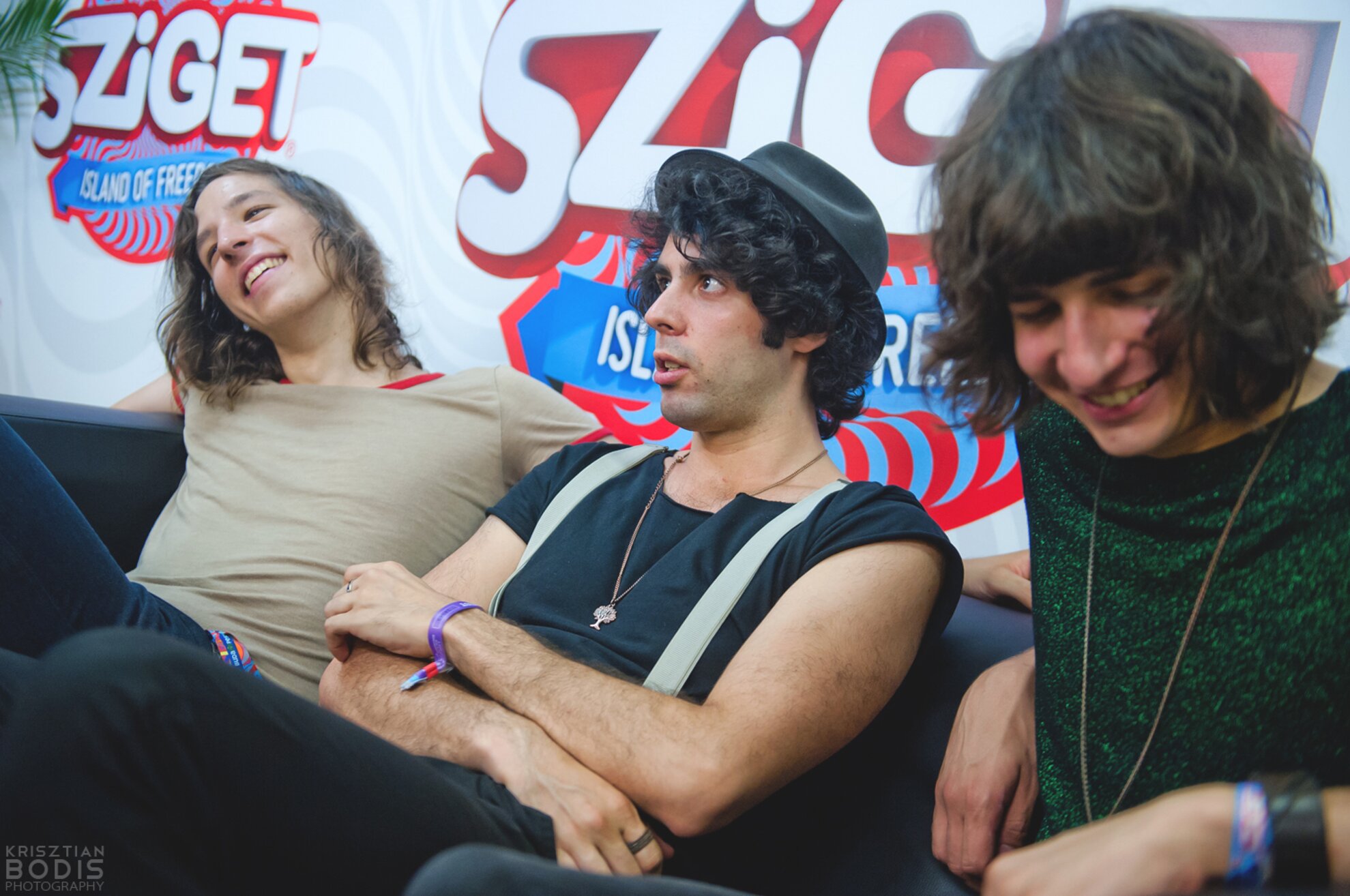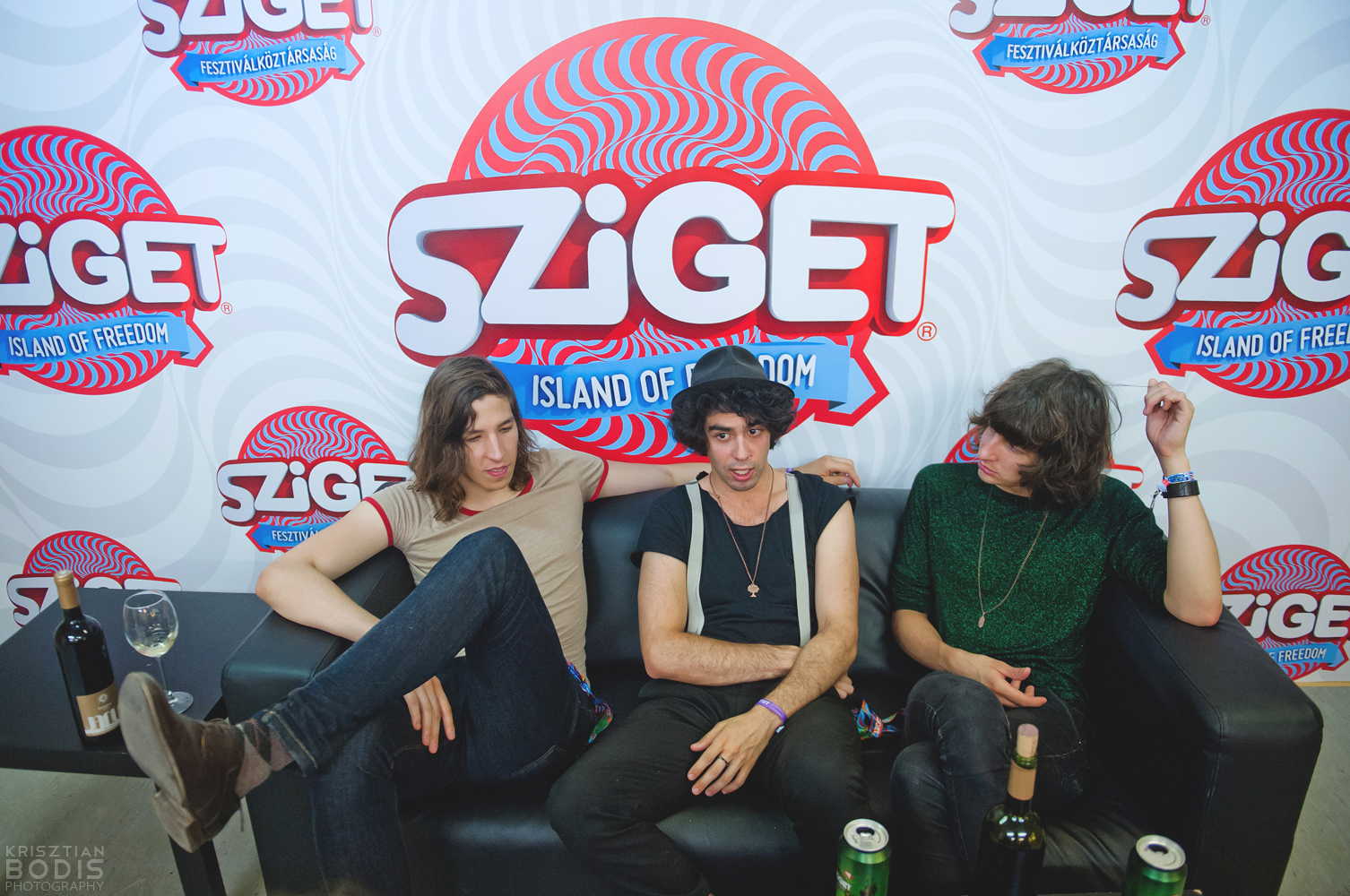
Is there a difference between playing for an overseas audience and a Hungarian crowd?
Iván
Vitáris: We love the Hungarian crowd – partly because they support us the most in what we do, they support us through thick and thin. Wherever we go, they give us huge energy at every single concert. And of course we play the most in Hungary, they're our livelihood. What is the overseas audience like?
Bálint
Simon: What we found interesting is that during last year's overseas performances we were received with the same level of excitement as here. After our performance at SXSW (eds: South By Southwest – one of America's most famous showcase festivals) last year, our song Take My Hand became the promo theme, in the same way that our song Together is the theme at this year's Sziget. And we had two almost full-house shows at SXSW. This was a really good indicator to know that Hungarian rock 'n' roll can find its place throughout the whole world. In the two most competitive markets in the world – America and England – the audiences like what we do.
The type of rock 'n' roll that you play is quite popular at the moment – it's enough just to think of the new Jack White album...
IvánVitáris: Absolutely!
Bálint
Simon:
This is why we're so lucky. We're fortunate that we got together in 2010 and two years later the world fell into a rock 'n' roll craze.
IvánVitáris: I'm really proud that we didn't copy someone else's style. We didn't practice and say: OK, here's '60s and '70s music from Deep Purple – "Machine Head", the Rolling Stones – "Exile On Main St.", and Led Zeppelin – "II"; listen to all that and that's what we'll be. No. We got together with our keyboardist,
István Beke,
and we wrote songs, and our own sound is what came out of that process.It's the same with the Sziget Festival anthem. We wrote our album
(eds: "Mode Bizarre") and Sziget came to us and asked us to write a theme song. So we gave them our album and said: here, pick from these. They chose Together and we agreed. Thank God – and this is what I'm really proud of –
we never had to get anyone's approval, we never wrote songs based on what was cool overseas or what the Sziget Festival wanted. It was always the people that chose our music –
because they like our music.
Bálint
Simon:
It's really lucky actually. Firstly, that the five of us found each other, and secondly
that
Iván was born, and thirdly that...
IvánVitáris: ...thirdly that you were born and so on!
Bálint
Simon:
Jokes aside, the biggest luck is that right at this moment this style of music is cool.

Why do you think that's the case?
IvánVitáris: It would be great if our keyboardist Beksz (eds: István Beke) was here, because he's almost a full generation older that us. The age difference is enough that he can see what's good and what's bad about our generation and the generation below us. Really, it's a case that we're in the same value crisis now that the youth of the '60s and '70s were in at that time. The young people of that time that were born around 1945 had parents that were killed in the war. There was some kind of moral crisis at that time that people could only claw their way out of when bands like the Rolling Stones stood out at Hyde Park and sang Street Fighting Man or Satisfaction.
Bálint
Simon:
Or our song "Jól Áll Nekem Az Élet" (eds: translation - Life Suits Me).
IvánVitáris: For example, Satisfaction still applies today, but now it's not because there's war at home or because the Soviet Union oppresses all the countries around it; instead it's about something different. It's about something like our generation not finding its place. Our generation is moving overseas because they can't find their place in the world, they're suffering some kind of moral crisis. But here's Beksz, he'll explain!
István Beke: This style of music is undergoing a revival here. Firstly, the generation is growing up whose parents grew up with this style of music. Secondly, for a lot of reasons this generation of young people feels the current situation is hopeless in a lot of ways. In the same way that perhaps the youth of the '60s and '70s – I'm thinking of the kids that grew up in the period after World War II. That type of hopelessness that young people felt 30-40 years ago is present among young people again now.
IvánVitáris: I'd add one thing, that this type of hopelessness always needs something positive to help people emerge. Our music is practically the child of five positive people. We love being together, we love Budapest.

Why is it good to be a young person or a musician in Budapest now?
Bálint
Simon:
This is where you'll find the world's best women. Budapest is so popular in the whole world right now. Probably because there's a creative energy here that's unique in the whole world.
IvánVitáris: I mean give me one other city where from the city center you can find hills, a river and flat lands. You can't right?
Bálint
Simon:
There's a shell that protects us, there's nothing like that elsewhere.
IvánVitáris: You can come from anywhere... America, London, Vienna, but there's nothing like this. Once we were coming home from somewhere and the tour driver agreed how nice it is here
when we went past the Chain Bridge and we saw the whole city. We can go to Vienna or New York, but you can't find this anywhere. Before our Sziget main-stage performance we went over the Margaret Bridge and people were crying. Where do you see that? You don't! You can't ever leave this.
Bálint
Simon:
The other thing is, for a small country like this, there's no other festival that's as big or as famous as Sziget. It's a festival where the stars of today perform alongside the stars of 10-20 years ago, plus local stars also get a chance to shine. This is a huge thing for us, especially because we grew up here, this is where we got drunk for the first time, this is where we saw our first concerts.
Bálint
Simon:
We were watching bands on the stage where we just performed, this is a huge thing for us. The other thing is we went out to America's biggest music industry festival, SXSW, and they know what Sziget is and they think it's a bigger deal that one of our songs is the theme song for Sziget than for the South By Southwest promo.

Did you achieve everything on your second album that you wanted to?
IvánVitáris: No, definitely not. I think if you look at, say, the Beatles' discography they had "Rubber Soul" and "Revolver" and other albums, that were like, "Oh God!", and then came "Abbey Road" where you thought: right, now you're going to split... and they broke up. A band has not one, two or three... but many albums that explain where they are at.
Máté Balla:
The first album was easier because our main concern, our main goal, was making a great album. But with the second album – while that was easy too – we had started a journey to find our path, which is totally fine, but we haven't reached the end yet.
IvánVitáris:
Oh, we haven't even started!
Máté Balla: All five of us are original band members, so that's a hard thing, but it's romantic too that on our second album we could move in a direction together. We all have different ideas but we can tune into each other and understand what each of the others wants from this thing.
IvánVitáris:
I always say that while the band can write tracks in five minutes – not because this is good or bad – this shows that band members are on the same page and on the same road. Otherwise one person has more control of the direction. We see that in a lot of bands, they break up because the magic of working together on a common goal dies. I think we should never have songs on the album that everyone doesn't stand behind.
Bálint
Simon:
Truthfully, here are five people that have worked together on two albums and found a common denominator, and this must mean something.




